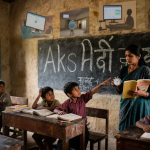- December 7, 2023
- by Educational Initiatives
- Blog
- 0 Comments
For children, a test question usually brings about a sense of dread and anxiety, as it acts as a tool of assessment, making them rely on their ability to memorize to be able to respond to it. But what if questions were looked upon as a means to help children learn? We, here at ASSET, strongly believe that questions act as a medium of learning and that assessment and learning are equally important to each other.
What is ASSET?
ASSET is a scientifically designed, skilled-based assessment test. While exam tests in general focus on assessing rote learning or memorization skills through multiple choice questions, ASSET goes beneath surface level assessment and tests the skills and concepts fundamental to the school syllabus. This idea of using questions as tools of learning stems from ASSET’s AQAD (ASSET-Question-A-Day).
Why ASSET-Question-A-Day (AQAD)?
The very essence of AQAD lies in ensuring that students interact with questions by thinking critically and not resort to the mundane process of answering through rote learning. This also eliminates the fear associated with answering a question, but becomes more like a game where you are being challenged.
AQAD provides questions right from grade 3 to grade 9 for the subjects of Math, Science, and Social Studies. A question is selected by educational experts from a large repository of ASSET questions and students can attempt these questions daily from Monday to Saturday.
Teachers can also use these questions in various ways in the classroom to help students learn. Some even use the last 10-15 minutes of the class to discuss these questions and clarify doubts.
Table 1 gives an idea of how a question might be allotted on a particular day. AQAD also allows students to give an explanation for their answers. This helps us understand the thinking process behind a particular response and enables us to clear up any misconceptions.

For the past two decades, Ei has been in constant engagement with the education sector, which has helped it formulate questions that test the conceptual understanding of children. These questions have made it possible to correctly identify the gaps in learning and rectify any misconceptions.
Extending the Reach of AQAD
The positive results from the implementation of AQAD in private schools encouraged us to introduce this concept in two different vernacular Indian languages: Gujarati and Hindi, under the “Science of Learning” project in collaboration with the Government of Gujarat. This was done to make these questions more accessible and provide their benefits to a wider audience.
A platform called “G-Shala” (Figure 1) was created by the state government to facilitate this, and Ei provided the questions that were uploaded on the app. In the month of December 2021, a total of 153 questions[1] for all three subjects were published on the app. In a single month, 11,564 students attempted math questions, 10,077 attempted science questions, and 4,541 attempted social science questions.

Figure 1: G-Shala UI with the Daily Question
Analysing the subject-wise data, we found that the most common wrong response indicated a lack of clarity in understanding the measurement of length. Within, Science and Social Science, the most common wrong answers indicated inadequate knowledge of animals and poor understanding of civic engagement, respectively.
Through this data, we were able to provide learning insights (Figure 2) which allowed teachers to alter their classroom strategy and cater to common misconceptions. This ensured that students who had a lower grade level understanding as compared to their peers, were able to clear their doubts and at the same time strengthen their basic understanding of concepts taught in the classroom.

Figure 2: Observations from the G-Shala App
Recently, the Central Board of Secondary Education has partnered with Educational Initiatives to strengthen Class 10 and 12 Board Examinations in India. Guided by the vision and spirit of the National Education Policy, 2020, this project will help CBSE and its affiliated schools transition to a system of competency-based learning. Over three years, this engagement will strengthen CBSE’s assessments capacity to ensure that the vision of the NEP translate to actions and outcomes.
To create widespread acceptance, salience and exposure for the project, CBSE and Ei have also jointly launched educational aids for students, teachers and other stakeholders, including AQAD (A Question A Day), a series of MCQ-style questions that will test students’ higher-order critical thinking skills. These have been made available to students from classes 3-10 through the website.
Translation Process
To launch AQAD in vernacular languages and upload questions onto G-Shala wasn’t an easy process. The first step was to semantically translate the questions into different vernacular languages. Subject experts carefully reviewed the upcoming questions for the next three months and proposed solutions that could be semantically translated without compromising on the quality and learning impact of these questions. Thus, the questions in Math, Science, and Social Science from grades 3 to 9 were first translated, and later all the translated questions and their responses were carefully reviewed to ensure that the questions did not appear to be literal translations.
Here are some examples of the same
- Grade 3 Math Question
English Version

This question was created for grade 3 students to assess their understanding of patterns. The same concept was taught to grade 3 students in Hindi and Gujarati medium schools as well. But this particular question could not be directly translated into vernacular languages as the English alphabet was taught from grade 5 onwards to these students, rendering the question incomprehensible. To rectify this, the question was modified to include numbers.
Hindi Version

- Grade 3 Science Question
Original Question

On reviewing the above question, it was found that it indirectly suggested the wastage of food. To rectify this, the highlighted items in the question were changed with more appropriate options.
Revised Question

The above examples highlight the in-depth review process that is undertaken to translate questions into vernacular languages and to make sure that the quality of questions is constantly improved.
In conclusion, AQAD presents an opportunity to change the way we look at teaching and makes us go beyond the regular methods of assessment through exams. It also encourages both students and teachers to focus on skill-building and ensures that learning is firmly rooted in understanding fundamental concepts.
__
[1] G-shala AQAD Monthly Data Analysis Report (December-2021)



